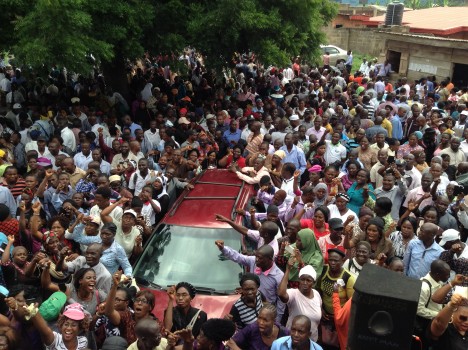
As July drew to an end, Oyo state workers suspended their 7-week strike in what was one of the sharpest theatres of class struggle in the country’s recent history. This was the second strike since May when after 11 days workers returned to work with promises that outstanding salaries would be paid
The general strike and mass protests which repeatedly grounded Ibadan, the state capital throughout June and July is clearly the deepest manifestation of resistance in the present period. While demand for the payment of half a year backlog of salaries was a very important one, another driving force behind the massive protest movement it called forth was struggle against the state government’s planned privatisation of 31 secondary schools.
On June 1, NLC and TUC leaders as well as civil society activists disrupted deliberations at a forum convened by the government for interested bodies towards instituting a Public Private Partnership for running the concerned schools. The following day, Comrade Waheed Olojede, the NLC Chair and six other trade union leaders invited for questioning by the police were arrested. Arraigned before the court on Friday June 3. Everything possible to stall their being bailed that day was done and they were not released until Monday June 6.
That day started with mass action by secondary school pupils who organised a massive demonstration through the city of Ibadan32. They attacked the APC secretariat and beat up those they found there before marching on other schools that did not start the protest with them, forcing out their colleagues, who most happily joined. They also sacked the house of Governor Ajimobi which had been his campaign headquarters and wrecked havoc on branded buses in the state government’s transport fleet.
The seven NLC leaders were released into this generalized mood of defiance. They were welcomed by a teeming mass of workers and radical activists led by the NLC National Vice President Comrade Solomon Adelegan and Deputy General Secretary Comrade Chris Uyot. Congress immediately issued a 4-point demand failing: dropping of the trumped up charges against the labour leaders; a halt of the planned privatisation of public schools; adequate funding of education and; immediate payment of the six months outstanding salaries owed public sector workers. An indefinite strike commenced on June 7 to press home these demands.
Since then till the end of the strike, workers held series of rallies, processions and other demonstrations in Ibadan as public workplaces across the state remained shutdown. Symposiums were organised at the NLC secretariat and in other places. Drama and music were also utilised for education on the strike and the conditions of workers, helping to deepen the class consciousness of rank and file workers.
The national leaderships of NLC and the Joint National Public Service Negotiating Council (Trade Union Side) were on hand at several times. The most significnat of these was on n Wednesday June 15 when they led a mass procession of workers, radical civil society activists and youths through the major cities of Ibadan, which literarily shutdown the ancient city.
While the Trade Union Congress’ leadership in the state did not officially come out in support of the strike, rank and file members of its affiliates in the public sector have also kept away from their workplaces. The TUC State Council Chair Andrew Emelieze, informed Socialist Worker that a unilateral declaration of the strike by the NLC constrained the council’s formal participation. He however addressed a number of press conferences, condemning the actions of the Senator Ajimobi-led state government.
In calling off the strike, the trade unions reached an agreement with the state government for the payment of January salaries immediately and the commencement soon of the payment of February salaries. This might seem an anticlimax after such an heroic struggle – a rotten deal. It is so, but also goes beyond this, for the working class as a whole – beyond the bureaucracy.
Much more has actually been won than the pittance offered by government and received by the trade unions leadership. A rebirth of radicalisation has been sown and subsequent class struggle in the Ibadan and its environs would most likely be enriched by these.
The strike also leaves us with many lessons. We must fight to end the system of capitalism that throws up the situation Oyo state workers and indeed workers across Nigeria and the world as a whole face – pauperisation. We might win victories and these are important. But, the victories cannot but be partial somehow or the other – until we finally defeat the bosses and build a better society with workers’ power.
by Baba Aye









